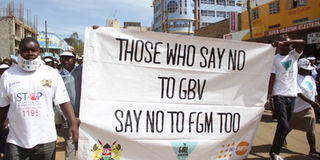Criminalising FGM won’t work, ending it in two years is futile

Campaign against female genital mutilation (FGM). Let us have an honest conversation on FGM among communities. PHOTO | FILE | NATION MEDIA GROUP
What you need to know:
- The voice that is missing or drowned out is that of medical experts, who need to step up and offer unbiased and objective clinical opinion.
- The worst enemy of girls in Kenya is not FGM but a combination of illiteracy, menstrual poverty due to lack of sanitary towels, high child mortality rates and teenage marriages.
Fight against female genital mutilation (FGM) is not to be considered a sprint but a marathon.
Kenya has a unique challenge compared to many other countries where the practice is common.
Anecdotally, we have the largest number of ethic communities that have ‘circumcised’ girls since time immemorial and etched in their culture. It will take more than threats and deadlines to succeed.
As a member of one such community, I would urge Kenya to consider a softly-softly approach to win hearts and minds before locking up FGM ‘offenders’.
I do not believe a millennia-old cultural practice need to be criminalised to be eradicated for not tally with modernism.
Criminalising cultural aspects of a community is a slippery slope towards wanton violation of rights. Which culture will fall foul next?
My concern lies in the fact that most of the communities that practice FGM still have the highest illiteracy levels among women.
AWARENESS
The elderly women who are given the honour to circumcise girls are mostly aged 70-90 and never attended school.
I say “honour” because it is a rite of passage that women in such communities have celebrated for centuries.
Whether that is borne of patriarchal influence is a separate argument.
It is presumptuous to think every woman in Kenya has access to the government policy outlawing the practice.
For illiterate women who live away from mainstream society in a cattle caravan in far-flung areas, it will be grossly unfair to charge them with a criminal offence for reasons not properly explained in the first place.
I do strongly believe, given the high level of illiteracy among rural communities, ignorance is a defence in as far as FGM is concerned.
Criminalising it is also bound to create easy moneymaking schemes for our bribe-hungry police.
QUALITY CARE
Also, it appears that FGM campaigns are NGO-led. Another NGO fad perhaps? Hence, it is unsurprising that there is mushrooming of briefcase NGOs keen on attracting Western donor funds.
Something Rachel Shebesh, the Ministry of Public Service and Gender Affairs CAS, alluded to in a speech in April 2018.
Which proves there may be a group of pseudo-gynaecologists who have become overnight FGM experts motivated by donor cash.
The voice that is missing or drowned out is that of medical experts, who need to step up and offer unbiased and objective clinical opinion. This would better guide both the State and the communities.
Male circumcision is equally a cultural and religious practice around the world. But injuries, fatalities and even HIV infections have been reported, especially in Africa at rural circumcision ceremonies for boys.
Their circumcision is legally offered in a clinical environment within hospitals if they choose to go.
Would it also not be equitable to offer girls circumcision in hospitals to avoid deaths and injuries allegedly associated with FGM rather than outright ban?
PERSONAL CHOICE
Labiaplasty (removal of labia minora and labia majora), which is a form of FGM, has become a surgical procedure preferred by women in the West for cosmetic reasons — apparently to make their anatomy more appealing.
Anti-FGM campaigners are being hypocritical and too harsh on women in the Third World by criminalising girls’ circumcision while labiaplasty goes on unabated in the West.
Young African women are lumped together with prepubescent girls on FGM issue when, legally, they qualify to make their own choices as adults.
Many of the anti-FGM campaigns in Kenya are conducted mainly in the counties of Samburu, Turkana, Marsabit (my ancestral home), Garissa, Wajir, Mandera, Tana River, Kajiado and Narok.
Ironically, these are areas with the highest illiteracy levels among women and the worst record of education facilities.
The funds being spent on anti-FGM campaigns would be best utilised by building schools in FGM-prone areas where girls can be encouraged to attend and from where it would be easy to sensitise them on FGM and other issues on women’s health.
HONEST DISCUSSION
The worst enemy of girls in Kenya is not FGM but a combination of illiteracy, menstrual poverty due to lack of sanitary towels, high child mortality rates and teenage marriages.
Let us not cherry-pick women’s problems just to appease donors. They are all worthy of attention.
We need patience and time to educate, inform and support the transition from FGM. This is not a journey for two years but three decades, at least, and that is only enough time to win hearts and minds.
FGM is an African problem that is being fought using Western values. Just as homosexuality is difficult to be accepted in conservative African communities, so is eradication of FGM.
Let us have an honest conversation on FGM among communities, the State and medical professionals to better manage circumcision of women. Criminalising FGM will push it underground, putting more lives at risk.
Ms Guyo is a legal researcher. [email protected] @kdiguyo





